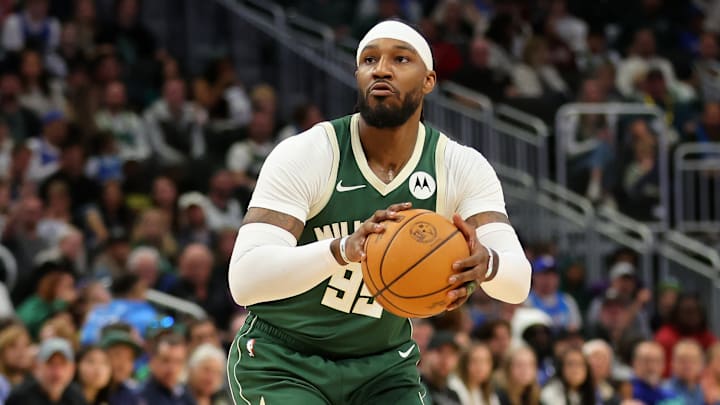The "betting on yourself" story boasts a pretty massive fanbase. If there's one person who is likely not part of said fanbase, it's former Jazz wing Jae Crowder.
At 34 years old, Crowder is fighting like hell to stay in the NBA. On September 10, Fox40's Sean Cunningham reported via his X account that the Kings would hold a workout for him.
According to sources, free agent forward Jae Crowder will be working out with the Sacramento Kings this week. The 34-year-old veteran was with the Bucks last season.
— Sean Cunningham (@SeanCunningham) September 10, 2024
Like last month with Isaiah Thomas, Crowder will join roster players in town seeking on-court competition.
To be fair, an NBA player fighting to keep his career alive at the age of 34 is pretty common because they have entered the twilight of their career. However, in Crowder's case, it didn't have to be like this.
Had Crowder not bet on himself two years ago, he may have never had to deal with the uncertainty of free agency in 2024.
How Crowder bet on himself (and lost)
Almost two years ago, The Athletic's Shams Charania reported that Crowder and the Suns had mutually agreed to part ways in the last year of Crowder's deal with the team.
The Phoenix Suns and Jae Crowder have mutually agreed that the veteran forward will not participate in training camp as the sides work on a trade, sources tell @TheAthletic @Stadium.
— Shams Charania (@ShamsCharania) September 25, 2022
Crowder himself sent a cryptic albeit boisterous message via his X account following the report that he would be leaving the Suns that very same day.
ONE MUST SEEK WORK WHERE HE IS WANTED.. WHERE HE IS NEEDED.! I AM THANKFUL FOR WHAT THESE PAST 2 YRS HAVE TAUGHT ME.! NOW I MUST TAKE ON ANOTHER CHALLENGE WITH CONTINUED HARDWORK & DEDICATION.! FOR THOSE OF YOU WHO CLOSED THE DOOR ON ME…. THANK YOU! 99 BACK SOON.! 🥷🏾🤫🤐
— JAE CROWDER (@CJC9BOSS) September 25, 2022
As more time passed, more details emerged regarding why Crowder was going this route in Phoenix.
So from what I have heard from players Jae Crowder wanted an extension - which he was not going to get. And was also told that he wasn't going to start or end games. And that is why we are where we are today.
— John Gambadoro (@Gambo987) September 26, 2022
So Crowder wanted out and was willing to sit out games until the Suns traded him. In other words, he was betting on that someone would take him because of his reputation as a 3&D wing that has helped playoff contenders like the Jazz, Suns, Celtics, and Heat.
The problem with Crowder's gamble was that teams don't give up a whole lot of assets for a. a flight risk, especially if b. the flight risk is a role player. If that wasn't enough, the Suns weren't going to hand him over, but teams didn't want to trade much for him, knowing all those factors and not knowing what he was still capable of since he wasn't even playing.
In the end, Crowder got his wish, but at the very last second when the Bucks acquired him at the trade deadline. By then, he barely had any time to show what he still had while also trying to get in game shape. It got so bad that Crowder openly questioned why the Bucks acquired him in the first place.
“Eleven years. Check my résumé. I’ve been playing. I’ve always been playing. “I’m very confused as to why I was brought here. I don’t know my purpose here and why I was brought here,” Crowder told the Milwaukee Journal-Sentinel.
The Bucks didn't trust him in the playoffs but had enough faith in him to give him another full shot. A full year with the team could familiarize him with the Bucks' schemes enough to make him look better, but his overall performance indicated that his previous half-season with them wasn't a mirage.
Again, the Bucks didn't trust him in the playoffs (despite being ravaged by injuries), and now he remains a free agent with training camp around the corner.
Crowder bet on himself two years ago but wound up making everything worse for himself by doing so. He could have played out his reduced role in Phoenix while making it clear that he wanted out. Doing so could have paved the way for him to improve his chances of getting another chance elsewhere, which could have earned him one last big contract before entering the stage where he'd fight for veteran's minimum contracts.
Because the bet failed, now he's doing late-offseason workouts for a team that may or may not sign him to a training camp deal.
We always love the stories about those who gambled on themselves because of the rewards that came with it all working out *if* it works out, but that's not always the case. Knowing how Crowder's career has turned out since his fiasco with the Suns shows that betting on yourself is an exciting move, but not always the best.
